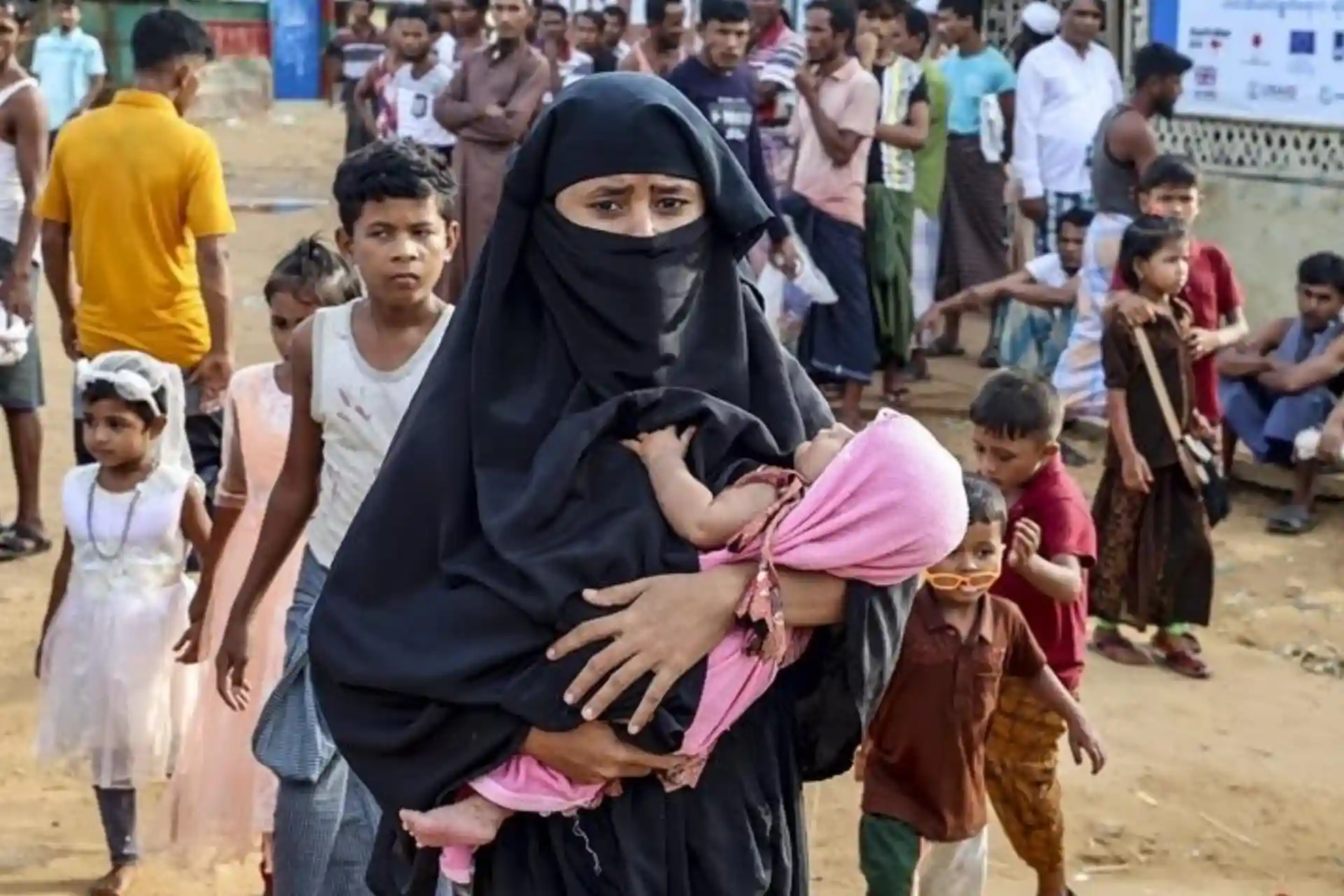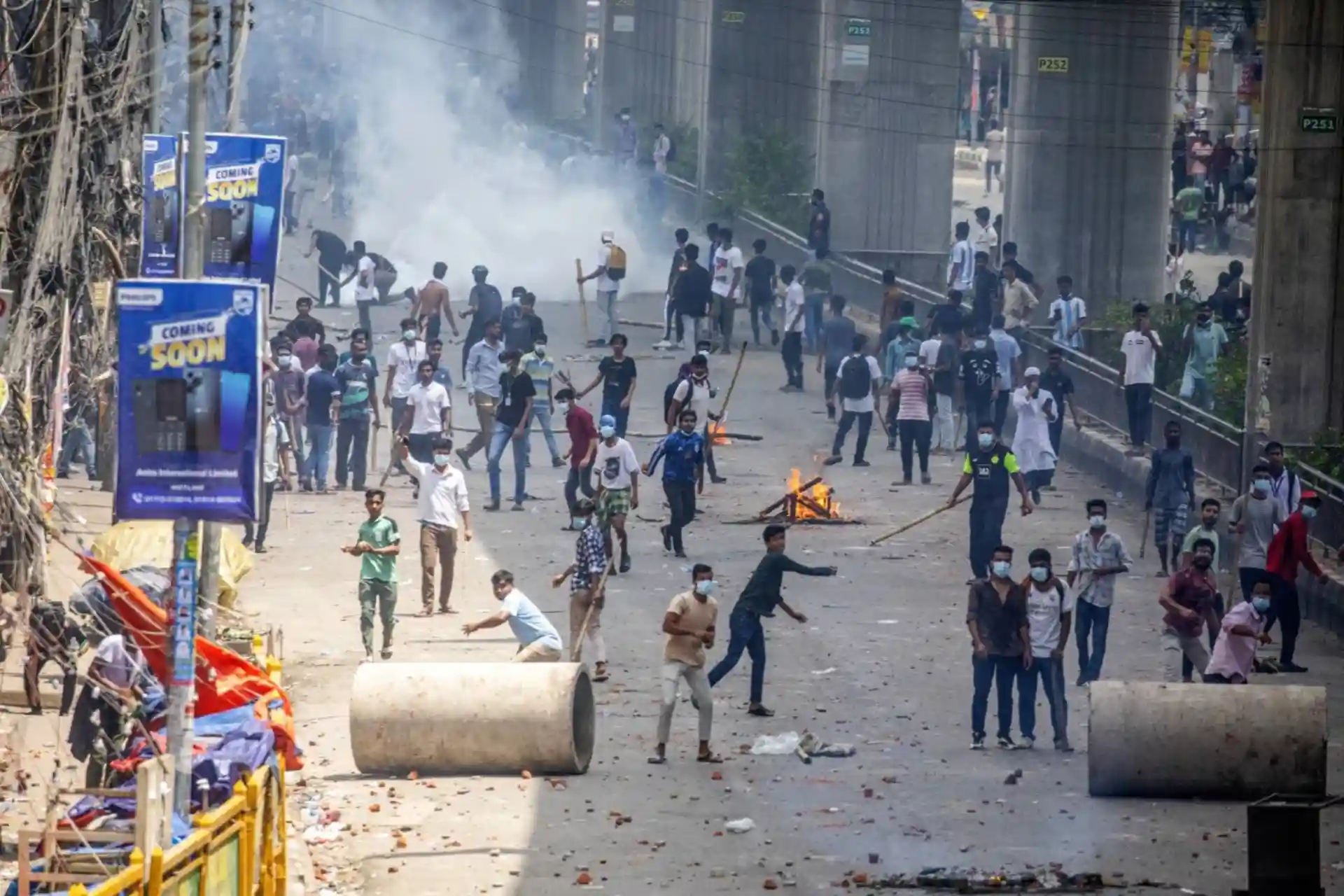"Today we are free!" - Revolution in Bangladesh. Why was the "iron lady" of Asia overthrown?
The situation in the world is becoming dangerous. The regions that were a place of stability yesterday are turning into places of abstraction and instability. An example of this is the turmoil in Bangladesh, one of the strongest countries in Asia, which has been developing strongly until recently. Bangladesh Prime Minister Sheikh Hasina Wazed, daughter of the country's founder and "father of the nation" Mujibur Rahman, has resigned and left the country after weeks of student-led protests turned deadly and into nationwide riots. The 76-year-old politician reportedly fled to India by helicopter and sought political asylum in the UK. It was an unexpected end to the reign of Bangladesh's prime minister, who had been in power since 2009 and ruled the country for more than 20 years. Sheikh Hasina was the country's longest serving Prime Minister till date. Politics is in the blood of Mrs. Hasina, who was born in 1947 in a Muslim family in East Bengal. His father was the nationalist leader Sheikh Mujibur Rahman, the "father of the nation" of Bangladesh, who led the country's independence from Pakistan in 1971 and became the country's first president. At that time, Ms. Hasina had earned a reputation as a student leader at Dhaka University. His father was killed in a military coup in 1975, along with almost his entire family. Only Ms. Hasina and her sister, who were traveling in Germany at the time, survived. After that, Hasina lived in exile in India, returned to Bangladesh in 1981 and became the leader of the Awami League political party, of which her father was a member. It joins forces with other pro-democracy parties during the military rule of General Hussain Mohammad Ershad. Hasina, who was supported by the people during the uprisings, soon became a national political icon. He was first elected to power in 1996, gaining notoriety for signing a water-sharing deal with India and a peace deal with tribal rebels in the country's southeast.
Mrs. Hasina, who contributed to the economic development of the South Asian country in recent years, started her political career as a supporter of democracy. However, in recent years he is said to have become an autocrat and is accused of suppressing any opposition to his rule. Politically motivated imprisonments, disappearances, extrajudicial executions and other crimes have increased during his rule. At the same time, his government has been accused of making numerous corrupt business deals and has been criticized for being too subservient to India. Accusations are pouring in. They have soul. However, Bangladesh under Hasina's rule appears fraught with conflict. First, the country, once one of the poorest in the world, has enjoyed solid economic success under his leadership since 2009. Now it is one of the fastest growing economies in the region, surpassing even its neighbor India. Second, its per capita income has tripled in the past decade, and the World Bank estimates that more than 25 million people have been lifted out of poverty in the past 20 years. Most of this growth is due to the textile industry, which accounts for a large portion of Bangladesh's total exports. In recent decades, the industry has developed rapidly, and apparel products made in Bangladesh have entered the markets of Europe, North America and Asia. Third, Ms. Hasina's government has built massive infrastructure projects, including the $2.9 billion Padma Bridge over the Ganga River, using the country's own funds, loans and development assistance. However, in our opinion, the reason for the end of Mrs. Hasina's career is to disagree with the US demand to deploy its troops on the island belonging to Bangladesh, and to pursue a neutral and independent foreign policy. The United States and Great Britain were able to make good use of one "hole". They were behind student leaders taking to the streets to demand the abolition of quotas in civil service jobs. They were moved. The fact is that in June 2024, a lower court reinstated quotas for relatives of veterans who participated in the war for independence from Pakistan, which was abolished by the government of Sheikh Hasina in 2018. This, in fact, led to the beginning of student riots. The Supreme Court of Bangladesh overturned this decision and reduced the quota to 5%, but this did not help.
Shpykh Hasina has made many mistakes in the past. A democrat has turned into an autocrat. After tasting the taste of the authorities, he began to put pressure on his opponents. He put them in jail. It caused him to be killed. They remember the "crime" committed half a century ago by the chairman of the "Bangladesh Islamic Community" in the opposition coalition. Mulla Abdul Qadir, who was 23 years old at that time, was naturally a non-chairman member of Bangladesh Islamic Community. The chairman of this party at that time sentenced this influential politician to death because he was in the ranks of this party and did not want Bangladesh to separate from Pakistan, although he is not present today. He was executed despite calls from the UN High Commissioner for Human Rights to appeal to the Bangladeshi government that the military tribunal was not in line with international norms and to suspend its sentence. The number is 163 million. There were many protests against this verdict in this extremely poor country with a population of more than 1,000. More than 40 people died and hundreds were injured in these demonstrations. Prime Minister Sheikh Hasina ignored these demands. Because he was supported by India and England. "Bangladesh Islamic Community" is a community that existed before the independence of Pakistan, and after the separation of the state of Pakistan from India, it was actively involved in the social and political activities of the country. The League promoted the ideas of the Islamic Brotherhood against the nationalists in the Awami Party. They helped the Pakistan Army in the war of independence. When Sheikh Majibur Rahman's party came to power, the activities of "Bangladesh Islamic Community" were banned. After Sheikh Majibur Rohman was killed, his successor, Ziyur Rohman, allowed the activities of the "Bangladesh Islamic Community". In the 2001 elections, the leader of the peaceful political community, Mullah Abdul Qadir, formed a coalition with the moderate liberal Bangladesh National Party, the Bangladesh Islamic Community, and this coalition defeated the Awami League. Even in 2006, he participated in the elections as part of this coalition , but the coalition could not win. But the protests turned into a major anti-government movement as a self-confident Sheikh Hasina brought in the police to crack down on the protests by force, killing more than 500 protesters and injuring many more. During Hasina's rule, the number of crimes such as embezzlement, looting, corruption and violence against citizens increased. Sheikh Hasina even went to the point of conflict with the acting Prime Minister Muhammad Yunus because of the fact that his bank granted preferential loans to the poor and the poor and his reputation among the public increased. He was imprisoned for half a year. Journalists who impartially covered the situation in the country were fired, imprisoned, pressure on the media increased. His latest actions, orders, and crimes have surpassed them all. Amid growing calls for Ms. Hasina to step down, she stood her ground. He denounced the agitators as terrorists and tried to repress them harshly. He arrested hundreds of people and initiated criminal proceedings against hundreds of people. The anti-quota campaign comes at a time when livelihoods have become more difficult and living costs have risen in Bangladesh following the pandemic. Inflation has skyrocketed, the country's foreign exchange reserves have plummeted, and its external debt has doubled since 2016. The opposition pointed to the mismanagement of Mrs. Hasina's government as the reason for this. Also, only those close to Ms. Hasina's Awami League have benefited from Bangladesh's previous economic success. They also claim that the country's economic development has come at the cost of democracy and human rights violations. Hasina has long been accused of repressive authoritarian measures against her political opponents, critics and the media. This is a serious accusation for a leader who once fought for a multi-party democratic state. Human rights groups estimate that at least 600 cases of disappearance and hundreds of extrajudicial executions have been observed since Hasina's return to power in 2009. Bangladeshi security services have also long been accused of serious violence and torture. In 2021, the United States sanctioned the Special Operations Battalion, a notorious elite police unit, for carrying out brutal extrajudicial killings. Many human rights activists and journalists were arrested, monitored and harassed. Critics say harsh laws have been applied to journalists, stifling press freedom. Ms. Hasina and her government have been accused of judicially harassing those whose case is being tried in court, such as economist and Nobel Peace Prize laureate Muhammad Yunus. Yunus was jailed earlier this year and faces more than 100 politically motivated charges, according to supporters. The accusation of murder against the former prime minister may turn out to be dramatic in the country. Because many citizens died in the protests, and a large part of the population directly blames Sheikh Hasina for this. Because he gave the order.
Economist, Nobel Peace Prize laureate Muhammad Yunus, who returned to the country from Paris after the riots, became the head of the interim government in Bangladesh. On Thursday, August 8, the swearing-in ceremony of 84-year-old Yunus was held at the presidential palace. At the ceremony, he promised to "defend the country's Constitution and carry out his new duties wholeheartedly" and called on citizens across the country to stop the violence. Later, in an interview with journalists, Yunus said that the country was waiting for a new day of victory and "gained its second independence". The decision to appoint Muhammad Yunus was made at a meeting between Bangladesh President Shahabuddin Chuppu and the leaders of the protest movement "Students Against Discrimination", which nominated Yunus.
Muhammad Yunus received the Nobel Peace Prize in 2006 for introducing the concept of "bottom-up economic and social development through microcredit". Grameen Bank, founded by Yunus, has provided microcredit to millions of poor people who want to develop their small businesses, thereby helping them escape poverty. Can the 84-year-old politician take the country out of the vortex of problems? It is not easy to keep the army of 18 million unemployed, mainly young people, busy and gainfully employed. The simplest question is to cancel the quota, which in fact has already been done. But it is not entirely clear what to do about unemployment and poverty. It is not easy to attract foreign investments and create new jobs in the conditions of today's global crisis, the game of sanctions and the world is drowning in a whirlpool of conflicts. But the people of Bangladesh, one of the most densely populated countries in the world, with 170 million people living in 150,000 square kilometers, have high hopes. They expect a number of reforms from the new Prime Minister. To respect human rights and freedoms, to stop humiliation and oppression, to create jobs for people. It is possible to fulfill the dreams of ordinary people. This requires the first desire. Secondly, the new Prime Minister needs patriotic personnel who can be a supporter, a shoulder to shoulder. If Muhammad Yunus can put an end to the corruption, bribery, nepotism, and human rights violations that have gripped Bangladesh, Bangladesh will be able to stand on its feet.


